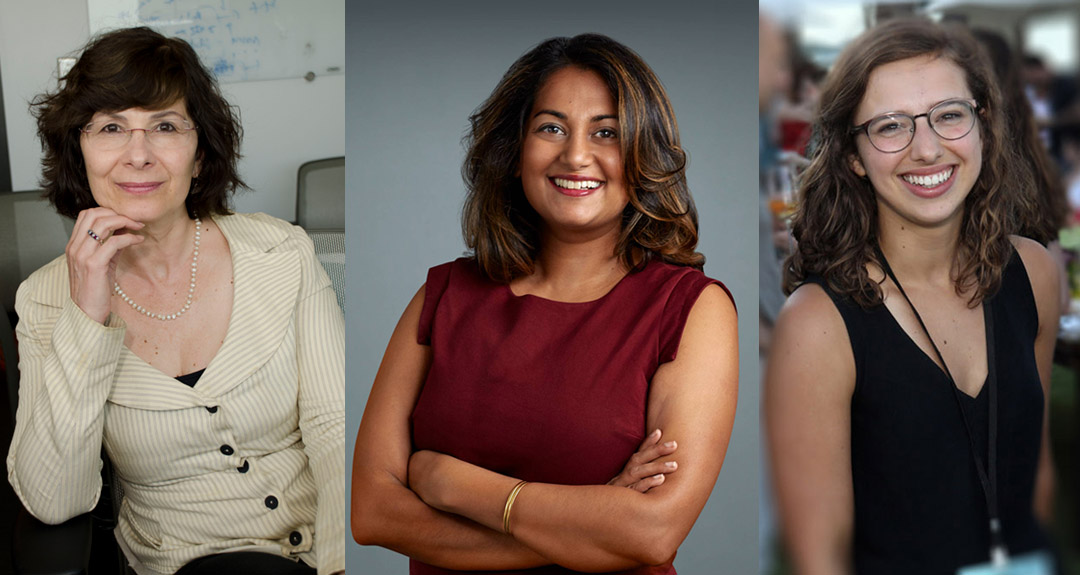
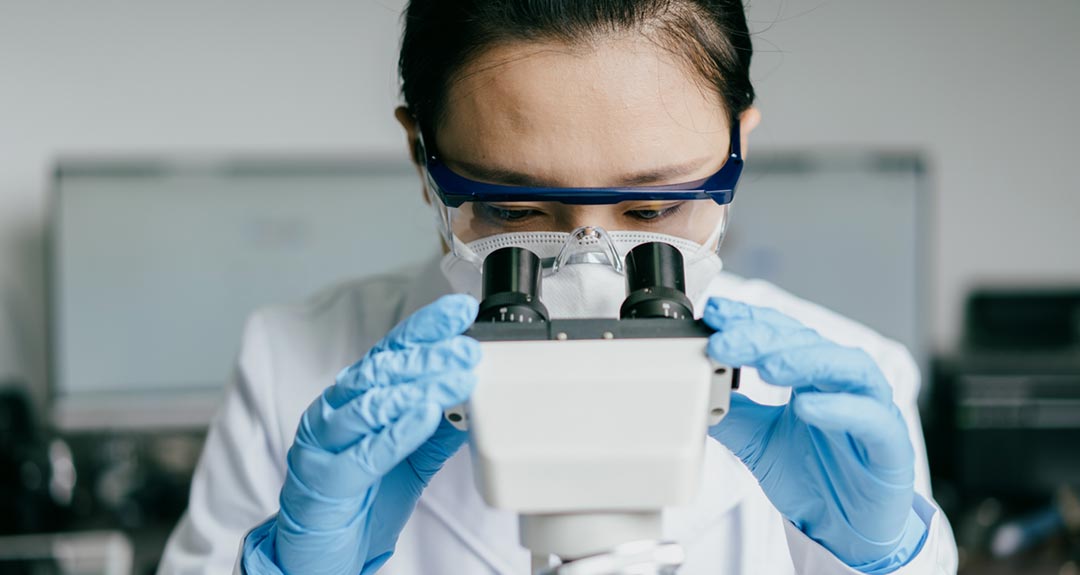
Photo credit: sinology, Getty Images
The COVID-19 pandemic has impacted researchers and their cutting-edge work on Inflammatory Bowel Disease (IBD).
A Global Community Responds
As the coronavirus pandemic swelled into a global public health crisis, it had a transformative impact on biomedical research and Kenneth Rainin Foundation grantees. Government, industry and academia mobilized on an unprecedented scale to understand, treat and control the spread of COVID-19. Biomedical research labs redirected resources and expertise to protect human health, collaborating across disciplines and borders. The pandemic also gave rise to more widespread public appreciation for scientific research and those delivering patient care.
“I am inspired by the continued strength of the scientific community and their ability to manage beyond what was expected to do great research.”
—Laura Wilson, PhD, Director, Health Strategy & Ventures
THE PANDEMIC’S EFFECT
What We Heard From Grantees
Investigators and trainees faced employment, educational and financial uncertainties.
![]()
![]()
COVID-19 restrictions and lab shutdowns slowed IBD research progress.
Female scientists with young children had less time to submit papers and seek funding.
![]()
Adapting To Uncertainty
The pandemic took a tremendous toll on researchers and their cutting-edge work on Inflammatory Bowel Disease (IBD). Principal investigators faced a new learning curve to guide and support their teams through an unprecedented time. Our Health grantees relayed wide-ranging stories from adapting their labs to non-IBD research to temporarily shutting down. Clinicians left their labs to meet urgent patient care needs, and other grantees pivoted their research to direct pandemic response. But pre-existing inequities exacerbated the impact on female as well as Black and Latinx researchers.
Listening was crucial to helping the Foundation understand how to sustain our scientific community through the uncertainty. Our Scientific Advisory Board provided critical guidance and pivoted along with our staff and Board to focus on flexibility and responsiveness. At the pandemic’s outset, due to the uncertain state of research, we made the difficult decision to pause the 2020 Innovator Awards cycle. The Foundation immediately offered no-cost extensions to current Innovator Award grantees along with grants of up to $50,000 to support labs.
In response to what we heard from grantees about their needs, we shifted our 2021 Innovator Awards timeline to provide earlier access to funding. This change allows labs to plan and retain post-docs and graduate students in June. The pandemic will have long-term impacts on the field and we remain committed to our Health grantees and safeguarding their groundbreaking work to advance IBD research.
“Our call to action as a funder was to reach out, listen and be attuned to the human impact on our grantee community. Then we responded quickly and strategically, with as much flexibility and support as possible.”
—Laura Wilson, PhD, Director, Health Strategy & Ventures
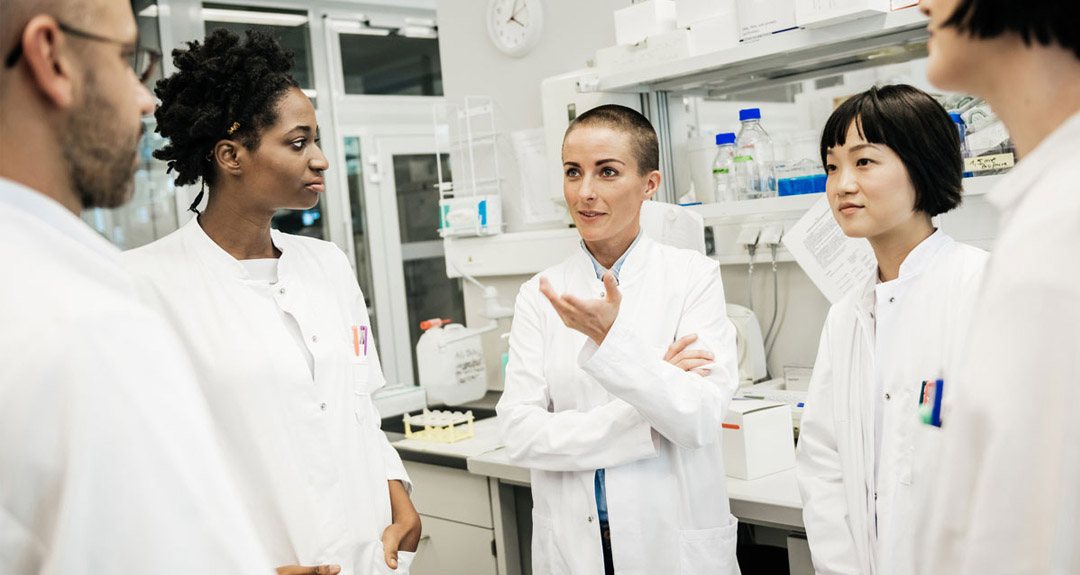
Photo credit: Hinterhaus Productions, Getty Images
Diverse perspectives are crucial to achieving scientific breakthroughs for patients.
Addressing Equity In Biomedical Research
The huge institutionalized systems for advancing research and delivering health care are overwhelmingly white, male and driven by conscious and unconscious bias. Over the years, we’ve taken steps to advance gender equity. In 2020, a reckoning emerged in both academia and philanthropy to also address racial inequities. The Rainin Foundation is engaged in this movement alongside other biomedical research funders.
We acknowledge how racism denies access to resources, including funding for scientists who are Black, Indigenous and people of color. In 2020, we embarked on a journey of inquiry into the role that the Rainin Foundation can play to address racial disparities in the biomedical enterprise. We began with honest conversations that leveraged the diverse expertise and leadership of our Scientific Advisory Board. Our work will continue by listening to our grantees and engaging partners to help us reach beyond our existing networks. Collecting grantee demographic data will help us monitor our own practices and better understand the state of our field. We are committed to doing our part to advance racial equity in the biomedical research field—a key step to advancing science.
—Dr. Tejal Desai, University of California, San Francisco, and a co-author of “Fund Black Scientists”
MULTI-GENERATIONAL INSIGHTS
Gender Equity In Biomedical Research
Photos courtesy of the researchers
Three scientists—Dr. Bana Jabri, Dr. Shruti Naik and Ansen Burr—offer their perspectives and insights for ways to advance along the path toward equity. The Kenneth Rainin Foundation is committed to addressing barriers that limit opportunity for women in science.
Creating Opportunities For Connection
By spring it became clear that an in-person Innovations Symposium event would not be possible. At the same time, we were hearing about the pandemic’s toll on trainees and early career researchers. Their work was suffering from isolation and the lack of opportunities to solicit feedback. We reimagined the Symposium to highlight their roles in advancing IBD research and to connect our grantee community.
Our 2020 Socially Distant Symposium was designed specifically for our grantees, convening more than 60 researchers over three half-days in November. The agenda included presentations by both Principal Investigators and trainees. Topics included milk-derived exosome therapies, the use of molecular imaging devices, non-surgical therapies using regenerative medicine and mechanisms underlying our sensation of pain. This event opened new avenues for us to support innovative research and collaboration. It laid the groundwork for creating our 2021 Symposium in July, which will be virtual and open to researchers worldwide.
—Christian Brendel, PhD, Dana Farber Cancer Institute/Boston Children’s Hospital
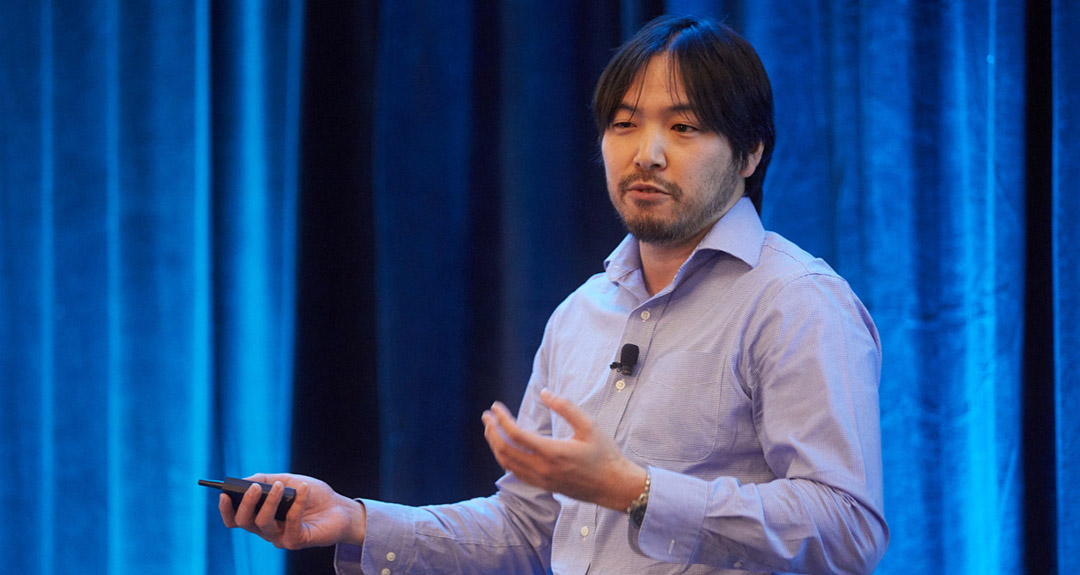
Photo credit: Mitch Tobias
Dr. Nobuhiko Kamada and his lab at the University of Michigan are researching the bacterial troublemakers that contribute to IBD pathogenesis, specifically Escherichia coli. Continue reading >
Revealing Our Funding Impact
The rapid mobilization of science and technology to develop effective COVID-19 vaccines is an unambiguous achievement. But that extraordinary pace was possible only after decades of investment in basic immunology and vaccinology research. Scientific results like this often emerge many years after funding has ended—especially for early stage and basic research. Yet measuring the impact of biomedical research funding is critical to advancing effective, strategic grantmaking.
The Rainin Foundation’s powerful new evaluation tool—Researchfish—is embraced by a global community of funders, research institutions and scientists. Its integrated platform enhances our ability to both evaluate our philanthropic impact and ease reporting burdens for grantees. We launched the new system for our grantee reporting in May. As we accumulate data on grantee progress, we will gain a longitudinal understanding of our impact on research and innovation.
—Nobuhiko Kamada, PhD, University of Michigan

Photo credit: Solskin, Getty Images
The Rainin Foundation supports research that could improve the prediction and prevention of IBD.
Bringing Solutions Closer To Patients
Despite limitations wrought by the pandemic, dedicated researchers continued their work to transform the prediction and prevention of IBD. In December, the Food and Drug Administration (FDA) granted orphan drug designation for TP-317 as a small molecule, oral therapy for treatment of pediatric ulcerative colitis. Thetis Pharmaceuticals, recipient of a Program Related Investment by the Foundation, developed this novel therapy. In preclinical models of IBD, the active agent in TP-317 resolved inflammation and promoted tissue repair without suppressing the immune system. This medication holds promise for people with IBD as well as acute respiratory distress syndrome (ARDS), a severe inflammatory condition of COVID-19.
Our Synergy Awards, which support cross-disciplinary research teams, included new and continued support for translational research projects that bring solutions closer to patients. Here are some highlights:
- Andrei Ivanov, PhD, Cleveland Clinic and Florian Rieder, MD, Cleveland Clinic – Current therapies for excessive scar tissue in Crohn’s disease patients do not target myofibroblasts, the main producers of scar tissue proteins. This team will test how the structural scaffold inside myofibroblasts plays a critical role in producing scar proteins.
- Shimon Reif, MD, Hadassah Medical Center; Yehuda Chowers, MD, Rambam Health Care Campus; and Maria Abreu, MD, University of Miami – Mammalian milk contains high concentrations of milk-derived exosomes (MDE) carrying immune-related molecules. Their preliminary results demonstrate that these exosomes have a beneficial effect on experimental induced colitis. This team will use specialized tools to assess using MDE in IBD treatment.
- Amy Lightner, MD, Cleveland Clinic; Miguel Regueiro, MD, Cleveland Clinic; and Yan Li, MD, Cleveland Clinic – These investigators are applying regenerative medicine in a Phase I clinical trial of targeted non-surgical therapies for the treatment of medically refractory Crohn’s colitis.
- Randy Longman, MD, PhD, Weill Cornell Medicine and Iwijn De Vlaminck, PhD, Cornell University – Their research explores a novel, non-invasive blood test for Crohn’s disease that would guide patient therapy and provide mechanistic insight into inflammation associated with Crohn’s disease.
“The Synergy Award gives us the unique opportunity to partner with a bio-engineering lab to tackle an out-of-the-box concept applying cell-free DNA diagnostics to IBD. If successful, this technology will provide us with an innovative blood test to track intestinal inflammation and microbial translocation, helping to manage and treat IBD in the clinic.”
—Randy Longman, MD, PhD, Weill Cornell Medicine
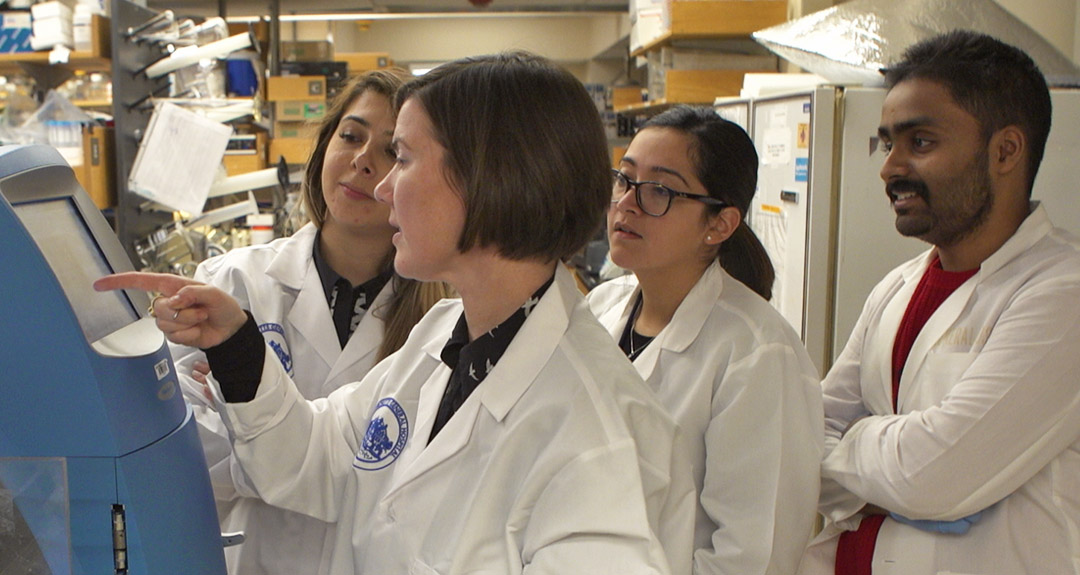
Photo credit: Lori Halloran
Dr. Kate Jeffrey and members of Jeffrey Lab at Massachusetts General Hospital are using CLIP (Cross-linking immunoprecipitation) to identify and sequence individual viruses that could be important for gut health or influential during inflammation.
Investing In Cross-Disciplinary Research:
2020 Grantees
The Rainin Foundation invested over $4 million in 2020 to support IBD research.
Health grantmaking supports groundbreaking ideas that have the potential to dramatically transform the prediction and prevention of Inflammatory Bowel Disease.
Note: Financials are subject to audit verification.

INNOVATOR AWARDS
Due to the pandemic’s uncertainty on research, we paused our 2020 Innovator Awards cycle, and responded by providing additional funding support and no-cost extensions to current grantees. This grant program resumes in 2021 to support an international pool of early-career and seasoned researchers to study untested ideas that could lead to breakthrough discoveries about IBD. View more information about this grant program.
SYNERGY AWARDS
Grants support cross-disciplinary teams of researchers who are pursuing collaborative projects aimed at improving the prediction and prevention of IBD. The 2021 Synergy Awards cycle has been put on hold. View more information about these grants.
Markus Neurath, MD, Friedrich-Alexander-Universität Erlangen-Nürnberg; Klaus Gerwert, PhD, Ruhr-Universität Bochum; and Arif Ekici, PhD, Friedrich-Alexander-Universität Erlangen-Nürnberg
Jeremiah Faith, PhD, Mount Sinai; Purna Kashyap, MBBS, Mayo Clinic; and Laura Raffals, MD, Mayo Clinic
Nobuhiko Kamada, PhD, University of Michigan; Peter Higgins, MD, PhD, University of Michigan; and Theresa Han-Markey, MS, RD, University of Michigan
Gwendalyn Randolph, PhD, Washington University in St. Louis; Michael Davis, PhD, University of Missouri; and Alison Kohan, PhD, University of Pittsburgh
Shimon Reif, MD, Hadassah Medical Center; Yehuda Chowers, MD, Rambam Health Care Campus; and Maria Abreu, MD, University of Miami
Amy Lightner, MD, Cleveland Clinic; Miguel Regueiro, MD, Cleveland Clinic; and Yan Li, MD, Cleveland Clinic
SYNERGY AWARDS – CONTINUED SUPPORT
Research teams who demonstrate significant progress toward their original goals are eligible for up to two years of additional support. View more information about these grants.
Charles Elson, MD, University of Alabama at Birmingham and Phillip Stafford, PhD, Arizona State University
Howard Hang, PhD, Rockefeller University; Ken Cadwell, PhD, New York University; and Thomas Walz, PhD, Rockefeller University
Kate Jeffrey, PhD, Massachusetts General Hospital; Naama Geva-Zatorsky, PhD, Technion – Israel Institute of Technology; Irah King, PhD, McGill University; and Corinne Maurice, PhD, McGill University
Garry Nolan, PhD, Stanford University; Sarah Streett, MD, Stanford University; Stephan Rogalla, MD, Stanford University; Aaron Mayer, MS, Stanford University
Thaddeus Stappenbeck, MD, PhD, Cleveland Clinic and Michael Diamond, MD, PhD, Washington University

